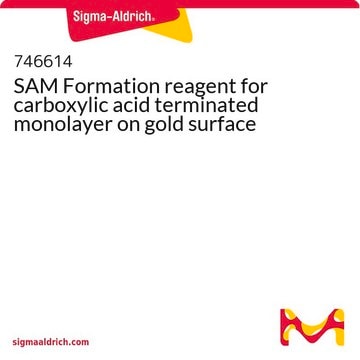674397
11-Amino-1-undecanethiol hydrochloride
97%
Synonym(s):
AUT, 11-Aminoundecanethiol hydrochloride, 11-Mercaptoundecylamine, MUAM
About This Item
Recommended Products
Quality Level
Assay
97%
form
solid
mp
120-170 °C
storage temp.
2-8°C
SMILES string
Cl[H].NCCCCCCCCCCCS
InChI
1S/C11H25NS.ClH/c12-10-8-6-4-2-1-3-5-7-9-11-13;/h13H,1-12H2;1H
InChI key
LOQACAFAHHWTBJ-UHFFFAOYSA-N
Related Categories
General description
Application
It can also be self-assembled onto gold electrodes for a study on the effect of terminal groups on the redox responses of ferrocene derivatives using the voltammetric method.
Signal Word
Warning
Hazard Statements
Precautionary Statements
Hazard Classifications
Eye Irrit. 2 - Skin Irrit. 2 - STOT SE 3
Target Organs
Respiratory system
Storage Class Code
11 - Combustible Solids
WGK
WGK 3
Flash Point(F)
Not applicable
Flash Point(C)
Not applicable
Personal Protective Equipment
Certificates of Analysis (COA)
Search for Certificates of Analysis (COA) by entering the products Lot/Batch Number. Lot and Batch Numbers can be found on a product’s label following the words ‘Lot’ or ‘Batch’.
Already Own This Product?
Find documentation for the products that you have recently purchased in the Document Library.
Customers Also Viewed
Articles
Recent research highlights tunable properties of inorganic nanoparticles, driving interest in optoelectronics.
Recent research highlights tunable properties of inorganic nanoparticles, driving interest in optoelectronics.
Recent research highlights tunable properties of inorganic nanoparticles, driving interest in optoelectronics.
Recent research highlights tunable properties of inorganic nanoparticles, driving interest in optoelectronics.
Our team of scientists has experience in all areas of research including Life Science, Material Science, Chemical Synthesis, Chromatography, Analytical and many others.
Contact Technical Service












